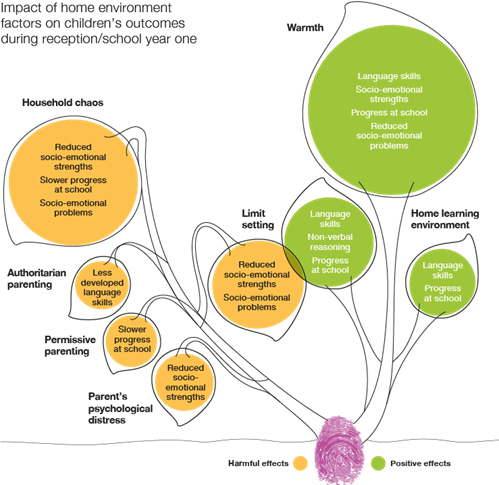Report summary
Aims and methods
This report presents findings for a sample of 3,186 children and their families who took part in the Study of Early Education and Development (SEED). This is a longitudinal study, led by Professor Edward Melhuish of the University of Oxford, that started in 2013 and that follows the same children from age two to seven looking at the impact of attending early childhood education and care (ECEC) upon children’s later development.
Interviews with parents when their child was aged two, three and four asked questions about early childhood education and care (ECEC) and characteristics of the home environment.
Child development at age five was assessed using each child’s Early Years Foundation Stage Profile information (EYFSP) at the end of reception year, as well as through direct assessment of children and teachers’ questionnaires during school year one.
ECEC quality was measured through observations carried out in 1,000 settings attended by a subsample of children in the study.
The report explores whether child development during reception and year one of primary school is associated with:
- The amount of ECEC that children receive between the age of two and the start of school.
- The quality of the formal group ECEC settings that children have attended between two and four years old.
- The age at which children first started receiving formal ECEC.
- The combination of types of ECEC that children attended.
- The home environment and the quality of the parent/child relationship between two and four years old.
Key findings
- More hours spent in informal individual ECEC (with children being looked after by relatives and friends) between two years old and the start of school was associated with better language development. (This and other key findings reported here are statistically significant.)
- More hours spent in formal group ECEC (e.g. day nurseries, nursery classes, playgroups) between age two and the start of school was associated with negative effects on socio-emotional well-being in school year one (increasing such socio-emotional problems as externalising and internalising behaviour and negatively affecting such socio-emotional strengths as prosocial behaviour and behavioural and emotional self-regulation).
- Using some type of individual ECEC (childminders, relatives, friends) was found to mitigate the negative socio-emotional effects of high formal group ECEC use.
- The age at which children start ECEC is important. For children from the 40% most disadvantaged families, starting to attend formal group ECEC no later than at age two and then continuing to use it until starting school for at least 20 hours per week was associated with better progress at school and better language skills.
- There was a positive association between attending formal group ECEC and language development, but only for children from families with the least enhancing home learning environments.
- There was no clear evidence of associations between the quality of ECEC which children had attended between ages two and four and their developmental outcomes during reception year or school year one.
For full results of the analysis, please read the report here.

The report also found that characteristics of the home environment have an impact on a child’s development and progress at school as shown in the infographic above.
Click on this link for more information about the home environment factors and child outcomes that were used in the report.
